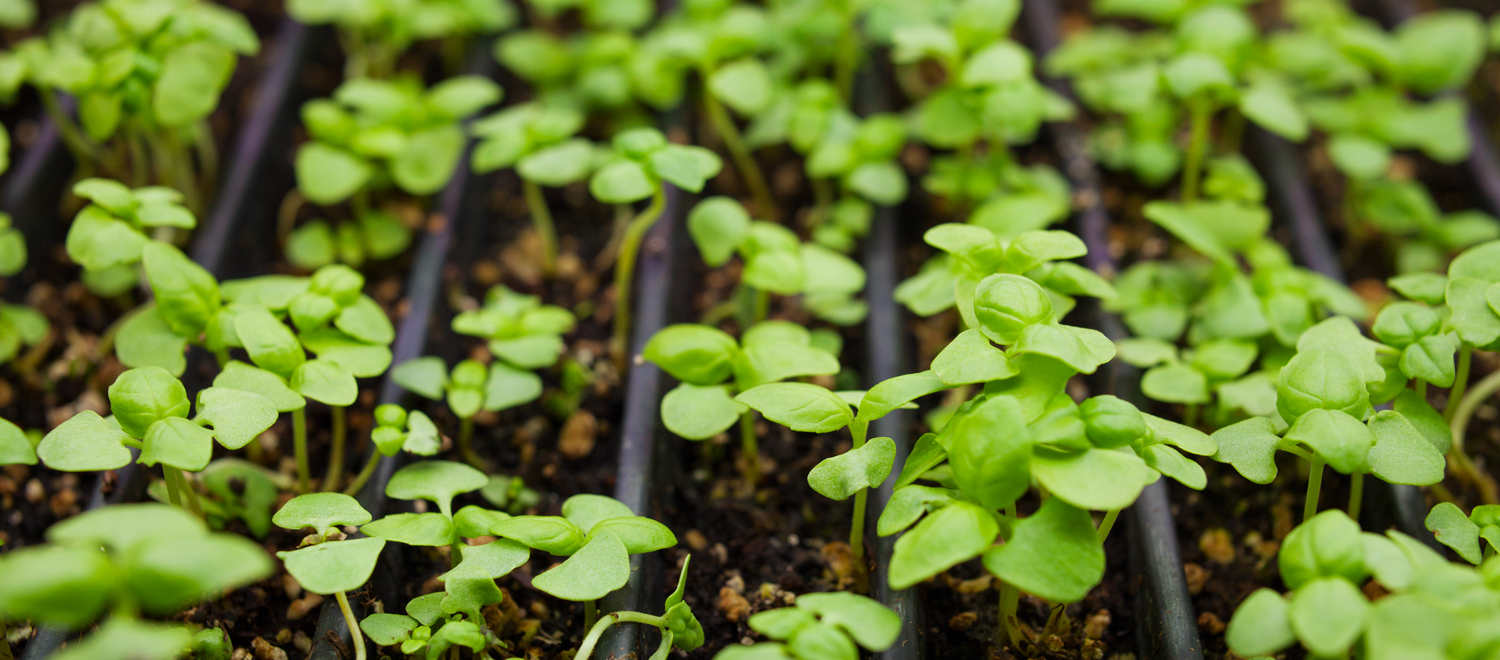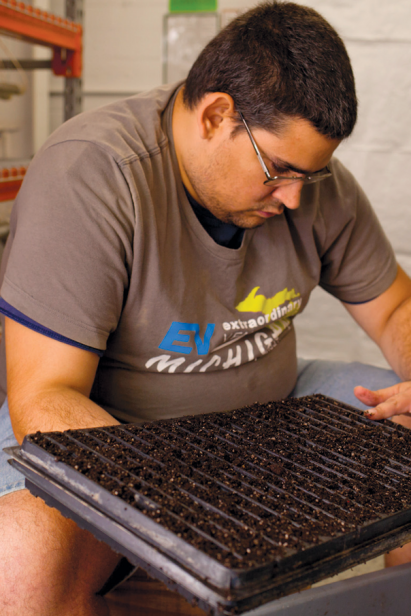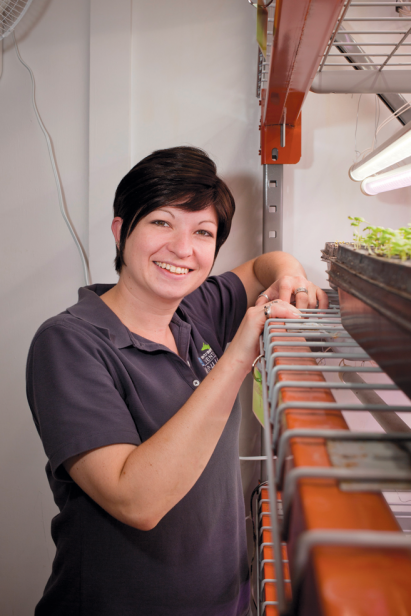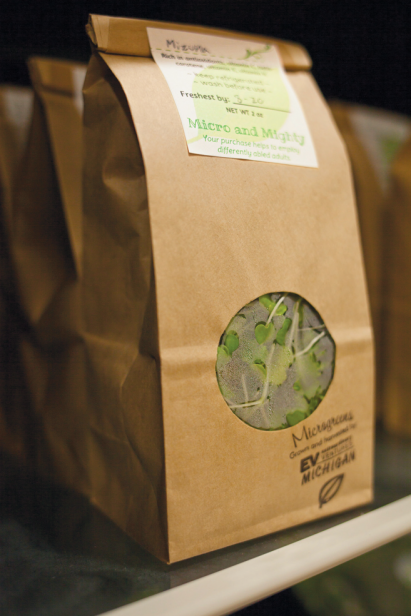Growing Greens and Jobs
A former boat factory north of downtown Oxford is unrecognizable today with its colorful signs touting recreational activities, offices and small businesses. Deep inside the huge building, down a dim hallway, the office of Extraordinary Ventures Michigan would be impossible to find without directions. This hardly seems like the place to grow anything, but EVMich is training autistic adults to grow microgreens here under lights and selling the nutrient-packed results.
“We’re focused on seven varieties now,” says manager Jillian Conrad. “We’ve tried a lot and these are the ones people like most, have the best yield for us and grow the best.” Just what are microgreens? These seedlings of vegetables and herbs are not to be confused with sprouts.
Sprouts are germinated seeds, grown in water; you consume the seed and stem. Microgreens are seedlings planted in earth; they are harvested after the first pair of leaves appear. You cut them at the stem; the seeds are discarded. Conrad pulls back a curtain to reveal three racks of shelves with LED lights where these most petite of plants are growing in an organic medium with nothing but “lights, water and love,” she says. Nearby is a worm bin, where the roots of cut plants are deposited. “We’re working on worm castings,” Conrad says. “That way we’re buying less soil, adding the castings and then the scraps.”
Extraordinary Ventures is a nonprofit that began in 2010 in North Carolina. Its mission is to provide employment opportunities for differently abled adults, mostly people with autism who have aged out of the public-school system generally at 26. EV came to Michigan in 2014, starting with a laundry operation at the Oakland University Incubator.
Conrad says the idea for growing microgreens originated with the university’s student organic gardening program. “I think it kind of fell into our lap,” she says. The students began growing the microgreens outdoors, then offered the operation to EVMich, providing research and expertise. “We were doing just a couple of trays a week and selling it there at the student farm market. We learned pretty quickly that was not the right market for us,” Conrad says. “And we were growing outdoors as well. We’d come back from a stormy weekend, and the trays would be all over the ground. We thought ‘If we go indoors, we can control the environment.’”
The entire EVMich operation is now housed at the Legacy Center in Oxford. In addition to growing microgreens and operating a laundry, autistic adults are employed in assembling small parts, making sensory toys and packaging and filling orders for several local businesses.
Chief microgreen gardener is Chris Plummer, who has been with EVMich since 2014 and works about 20 hours a week. As he bends over a tray, he is focused intently on the tiny seeds, sprinkling them into the narrow rows of the tray. “I like watering them, and I like to see how they taste,” he says. His favorite is mizuna, a Brassica also known as Japanese mustard green. “It tastes spicier,” he says. Conrad compares it to horseradish, but not as spicy. “He knows the whole process start to finish and can teach it to someone else,” she says. “He really takes pride in what he does.” The microgreens are ready for harvest in 10–15 days and are sold in several varieties. A mild mix contains De Cicco broccoli, Ruby/ Rhubarb red chard, mizuna and Red Russian kale. Also available individually are beet, broccoli, basil, mizuna, pea shoots and the kale, which Conrad described as a bit sweeter than green kale. They come packaged in small brown paper sacks; the labeling indicates that proceeds support people with autism. “This was grown from seed to harvest, and this is who you’re supporting,” Conrad says.
On the day we visited, pea shoots were available for sale. They had a definite pea taste, like snow-pea pods, but milder and just as crunchy. Microgreens are said to have more flavor when compared to sprouts or mature plants of the same varieties, “often very intense flavors, but not in a bad way,” Conrad says. “‘Full flavored,’ I like to say.” She suggests using them in smoothies, salads, sandwiches and even adding them to pizza or other cooked food as a garnish. They will wilt but don’t turn to mush, she said. Research conducted by the US Department of Agriculture found that microgreens also contain higher levels of some nutrients important to human health, such as vitamins C, E, K and beta carotene. “In general, microgreens contained considerably higher levels of vitamins and carotenoids—about five times greater—than their mature plant counterparts,” a report on the USDA website states.
While the Food and Drug Administration warns against eating sprouts, even home-grown, due to repeated incidents of food-borne illness, microgreens carry no such warning. The microgreens are sold at the EVMich office during office hours, 9am–3pm weekdays, at Fuel Your Life Café in the same building or by subscription at EVMich.org.
“Our number-one hurdle is customers,” Conrad says. She’s getting the word out by taking the products to vegan and vegetarian events and through cooking classes.
“I grew up to be a teacher, but it’s fun to be in the learning process,” Conrad says. “I’m really becoming so much more aware that grocery stores don’t provide everything.”
EVMich.org







